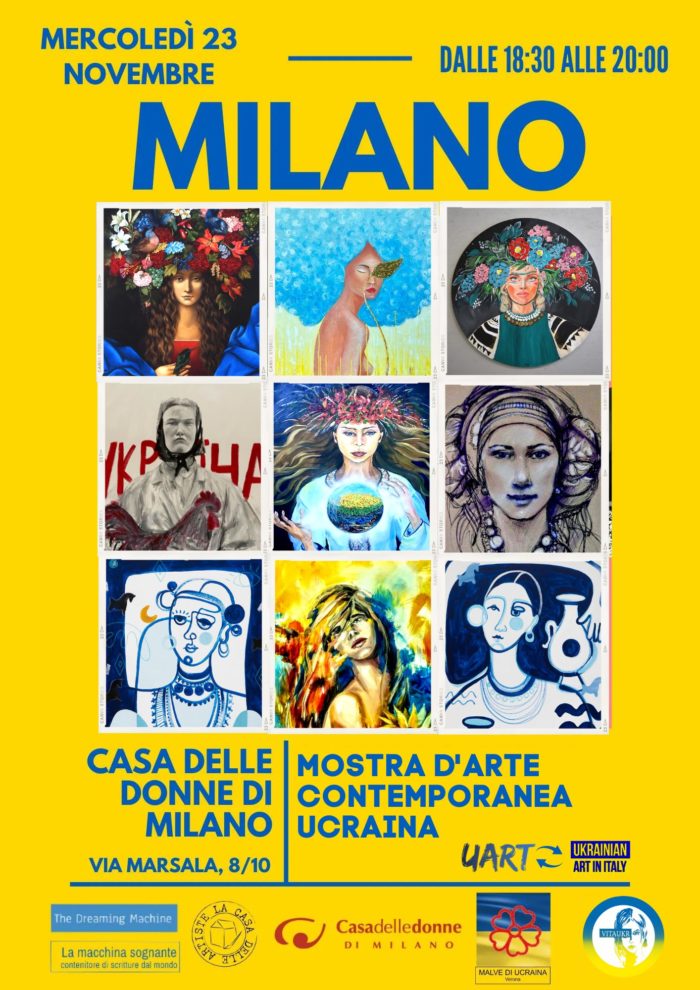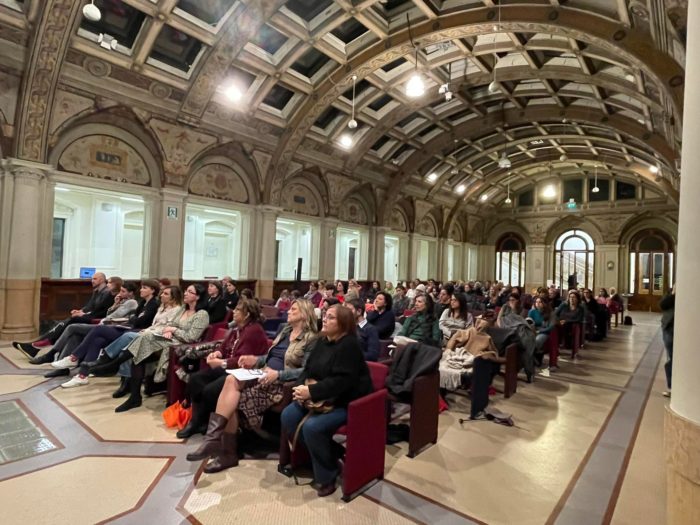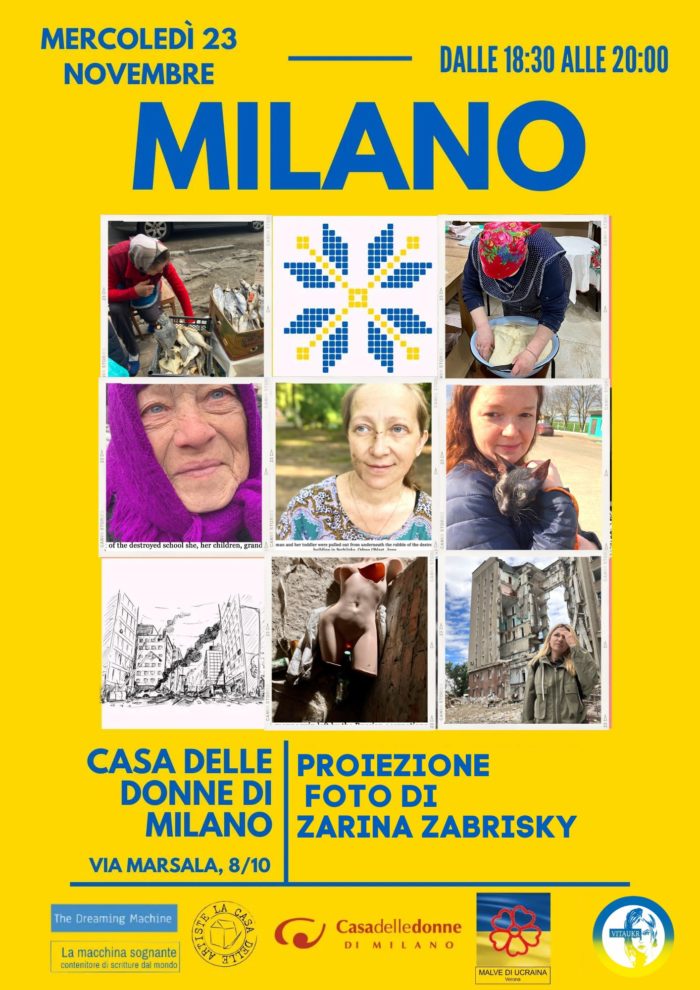Three Ukrainian poets Natalia Beltchenko, Iya Kiva and Oksana Stomina go on a poetry tour in Italy in November 2022, using verse to communicate the tragedy and hope of Ukraine's struggle against the brutal Russian invasion. With stops in Abano Terme, Bologna, Verona, Milan and Rome, the tour crosses northern and central Italy. It was designed with the collaboration of writers, activists, and cultural operators, literary journals, Ukrainian civil society associations, museums, women's organizations, cultural spaces, translators, refugee solidarity associations, and municipalities.
Bilingual poetry readings in Ukrainian and Italian with an on-site interview followed by Q&A offer the maximum room for a conversation. The three writers will discuss the changes undergone by the structures, styles, and themes of poetry in war settings, especially when everything happens live, in the acceleration of time brought about by new technologies and social media. The three poets touch on different poetic cores ranging from the relationship with nature while a war is underway (Beltchenko), to what it means to be in a country that is trying to define its identity and relationship with the language, especially when Russian was the language in which poetry was written before the invasion (Kiva), the trauma of seeing one's city, Mariupol, razed to the ground and one's identity and culture canceled (Stomina).
Euromaidan Press spoke to Pina Piccolo, the tour organizer, a writer and a cultural promoter who writes in Italian and English, having lived in California and Italy for many years. She is the editor of The Dreaming Machine and one of the editors of the online Italian language literary journal La Macchina Sognante.
EP: How and why did you decide to arrange the Ukrainian poets' tour in Italy?
The idea of organizing a national tour of Ukrainian poets in Italy came on the heels of months of publishing contemporary Ukrainian poets in the Italian language online literary journal La macchina sognante. Starting from 26 February until today, we have published over 20 articles containing the translated writings of over 40 writers, both in Ukraine and in the diaspora, ranging from Halyna Kruk to Serhiy Zhadan, Natalka Bilotserkivets, Ilya Kaminsky, Iya Kiva, Irene Shuvalova, Natalia Beltchenko, Ella Yevtushenko, Yury Zavadsky, Anastasia Afanasieva.
For the first six months, they were translated into Italian from English language translations available in US literary journals. Many of the poems and prose pieces that we initially published in Italian were translations by Amelia Glaser and Yuliya Ilchuk, Ilya Kaminsky, and Katie Farris. Later when we started collaborating with Marina Sorina, a Ukrainian expat who has been living in Italy for many years and is an Italian writer, we could have translations from the original Ukrainian and we added pieces by Oksana Stomina, Inna Romenska, Elina Sventsytska. Marina Sorina then joined in the efforts to organize the tour and was essential to integrating the Ukrainian community in the process.

Though some of the other literary journals like Doppiozero, Nazione Indiana, Inkroci occasionally carried pieces by Ukrainian writers, the overwhelming majority of paper literary outlets, websites, and the media, in general, were not at all interested in featuring Ukrainian voices: the worst example being Italian television, talk shows and political opinion commentaries which featured so-called Italian experts eager to ‘interpret’ the situation for viewers. Out there in the mainstream media, it’s generally a Westsplaining
fest, corroborated by the occasional Russian spokeswoman or military expert.
This dearth of Ukrainian ‘live’ voices convinced us of the necessity to start ‘importing’ some, hoping to at least make a dent in the consensus among Italians who are prone to keep ‘equidistant’ from the war, wave peace flags calling for improbable ceasefires, and in their vast majority eager to blame NATO for the situation.
Our journal has traditionally given space to writers whose voices are not heard or are silenced. Given that the institutional clearing houses of ideas were not going to do it, we decided to use the writer networks.
Who are the poets you are bringing on the tour?
The three poets we chose are very different from one another not just in geographical terms.

Oksana Stomina hails from Mariupol, Iya Kiva lives now in Lviv but is originally from Donetsk, and Natalia Beltchenko is from Kyiv though she is now in Poland on a residency provided by the Polish government. In the three meetings we have had so far in Abano Terme, Bologna, and Verona they complement each other.
Oksana’s passionate, yearning voice is rooted in her personal experience as an inhabitant and volunteer of Mariupol, a city that has nearly been razed to the ground by the Russian army, her husband is currently a prisoner of war and she is not ever sure whether he is alive or dead.
Natalia Beltchenko adds a more literary, lyrical touch with her masterful use of poetic language and metaphor, integrating the natural world, objects, and literary figures.
Iya Kiva’s contained fury resorts to distancing and paradox to invert situations, drawing from history both personal, national, and international to expose the core of contradictions she as a person and Ukraine as a nation are facing, even at the level of what language to use to express herself.
What are you hoping to achieve?
With their verse and testimony, the three of them are an ‘explosive’ mix. We hope the meetings with them will help people here in Italy take sides with the resistance of the Ukrainian people. Not out of ‘compassion’ but in recognition that their struggle and resistance, rooted in the right to self-determination is just and in keeping with the aspirations of people everywhere including here in Italy. The consequences of their defeat will have negative repercussions for everyone and not only in Europe. Their victory gives some breathing space for the world to confront the big challenges of today like changing the way we live within the environment, the relations between people in terms of gender issues, etc.
Though we have predicaments of our own, not least of late our overtly fascistic government, it behooves us to recognize that our destiny as a people is not at all separate from that of other people of the world, including that corner of the world where a struggle for survival and resistance to a pernicious, autocratic and yes the capitalist system is taking place.
What is the general attitude to the war in Ukraine in Italy?
Unfortunately, the general attitude here in Italy is supportive to some degree when it comes to material aid or being ‘compassionate’ to the victims of Russian aggression in a Catholic sense, but leery of getting directly involved in a war that many perceive as a proxy war between the US and Russia.
Many Italians whose idea of Resistance has been cultivated in a totemic, mythological dimension in relation to what took place on Italian soil at the end of WWII, have a hard time applying those lessons to what is happening in Ukraine today. Interestingly, the organization that keeps the memory of the partisans alive (all of the old partisans being dead now, as those events took place in 1943-5) called ANPI, is one the most ardent defenders of the idea that NATO is to blame. They hold a lot of sway on the Italian movement because of the prestige behind the historical process they claim to represent, thus their lack of support for Ukraine has serious repercussions.
Did the feelings about the Russian war in Ukraine change with the new government now in power?
The previous government which was a grand coalition that included all the major parties – both Left, Center, and Right and was headed by Draghi supported Ukraine and was providing arms (though. in reality, Italy did not provide significant military assistance).
After the elections that took place three months ago, the government is in the hands of a coalition of right-wing parties. Giorgia Meloni, who is the Prime Minister and head of the Fratelli d’Italia, the neo-fascist party, has committed to continue supporting Ukraine militarily as well as apply sanctions on Russia, but she is also feeling the pressure of her coalition partners Berlusconi, who is a historic ally of Putin and Giuseppe Conte who represents the Five Star Movement aligned with Moscow to lift the sanctions. Paradoxically all of these demands and pressures are also coming from leftist parties.
The Democratic party (a party of the Center with some currents that are vaguely to the left) is riddled with internal conflicts about support for Ukraine, it was in the space between such contradictions that we found some support for our tour, as well as among many other people of conscience who are not necessarily aligned in a traditional political way. Some of the municipal council representatives for culture came to our support and helped secure the spaces to hold the readings in (for example the auditorium in the Main Library in Bologna, the equal opportunities representative in Verona, and in Abano Terme).
What are the challenges of organizing the Ukrainian poets' tour in this political landscape?
Some of our main challenges came from the various cultural circles who would have to abandon their ‘comfort zone’ if they helped build the tour or came to it. Almost immediately after the invasion of 24 February, many Italian cultural organizations started organizing events ‘against all wars’ uniformly failing to mention Ukraine. Other groups crystallized around identity issues, solidarity with other international struggles proceeded with their work with a business-as-usual attitude and declared their suspicion of the government's favor for the Ukrainian cause and lack of support for theirs. Within this context, it was a challenge to make people understand the importance of taking sides on the issue or framing the situation of Ukraine as a colonial war project, as the only possible imperialist power is customarily the US and it is hard to perceive Russia (still in the mind of many boomers like me still being associated with the Soviet Union). Anti-Americanism (some of it justified, some of it a cold war heritage) is prevalent at the ideological level, especially among intellectuals.
Do you think the Kremlin narratives are being spread in the information space in Italy?
It is important to keep in mind is the relentless pro-Russian propaganda currently and in past years here in Italy. It has penetrated through social media and media outlets like RT, Sputnik, and of course through social media, and most likely through money that has trickled down to the political parties.
Another big cultural influence in Italy is that of Cuba, through the prestige of its antiimperialist struggle and the US blockade. Many cultural organizations and festivals are associated with Cuba and there is a feeling of general benevolence for its government, the Cuban doctors, etc.
All these obstacles aside, the plus side though, we had the early support of the MAXXI, one of the most prestigious contemporary art museums in Italy, without whose support this tour could not have taken place and to which we are greatly indebted.
Recently the prestigious journal Micromega, which has a large following among intellectuals, has begun to explicitly take on a position on Ukraine and urge others to leave their comfort zone by providing convincing arguments about the colonial nature of the Russian enterprise and the pernicious nature of Westsplaining.
Do you feel that culture can influence collective mentality? Do you think that poetry and art can reach those who are "not interested" in politics?
Yes, I am obviously convinced that collective mentality can be influenced by action in the cultural sphere otherwise I would not have embarked on this adventure. It is a difficult process, but I do believe that there are people whose conscience is still awake and though they vacillate because the prevailing public opinion and that of their friends is in favor of ‘equidistance’, the brutality of the Russian invasion, the extremism of Putin’s pronouncements and the evidence of what happens to the opposition in Russia does not sit well with them and can spur them to take an inconvenient stand.
We have had evidence of this over the months, as many of the initiatives we have launched in support of Ukraine have found support. On September 7th, we joined the worldwide readings launched by Internationales Literatures Festival Berlin. We had 12 poets reading from the Italian translations of Ukrainian writers.
In the course of organizing this tour, we have seen important media outlets like Internazionale publish a poem by Oksana Stomina and information about the tour. The historic Left newspaper Il Manifesto published an interview with Iya Kiva. Poems by Natalia Beltchenko were published by Nazione Indiana, perhaps the most important online literary journal in Italy.

So we continue with our work, trusting in the power of poetry and personal testimony like the ones that can be provided by our three poets to help change the cultural landscape. In some of our meetings, the poems will be accompanied by visual art forms, like Zarina Zabrisky’s photos, and Vitaukr’s art exhibit in the Milan meeting, and at the MAXXI event a short documentary shot by photographer Niccolò Celesti. His photographs will be projected as the poets read.
In a way, we expect that people who come to the readings are people who are interested in literature or current events, but people who might not be interested in politics in its ‘institutional’ form are not immune to having to deal with the consequences of politics and it’s in that ‘space’ that poetry can penetrate especially when delivered in a way that speaks its truth.
Natalia Beltchenko, Iya Kiva and Oksana Stomina’s poems as well as the writings of over twenty-five other contemporary Ukrainian writers, can be found in the Italian language online literary journal La Macchina Sognante, the digital magazine that has been a driving force for the tour. With a repertoire of over 25 articles published from February 26 to today, including the poems of Halyna Kruk from whose poem the title for the tour is taken, most of the writings were translated into Italian using English as the bridge language, and some poems have been translated from Ukrainian thanks to the collaboration with the writer and activist Marina Sorina.
The tour opens in Abano Terme on November 18, from 8:00 PM to 9:30 PM in an evocative place such as the theater inside the Amleto and Donato Sartori International Mask Museum and then continues in Bologna on the 19th, from 6:30 PM to 8:00 PM in the central space of the Enzo Biagi Auditorium of the Sala Borsa library often serving as an agora for the whole city. This event is produced with the collaboration of the Bologna4Ukraine, the Associazione Culturale Italia-Ucraina, Bologna and Malve d’Ucraina- Verona, all organizations that have done so much to put Ukraine and solidarity with the Ukrainian population at the center of attention. Collaborating to the event are also l’Associazione delle donne Orlando and the theater group Sblocco5. Photographs by a US writer/journalist Zarina Zabrisky documenting the harsh reality in the country over the past nine months will be projected during the interview. The tour then continues in Verona on November 20, from 6:00 PM to 7:30PM, in the intercultural women's space Casa di Ramia, in a meeting organized by the Ukrainian immigrant grassroots organization Malve d’Ucraina which places center stage the dialogue between the three poets and the Ukrainian community and immigrants from other countries, conducted by the writer and activist. Marina Sorina. The next stop on Tuesday 22 November is Trento where poets who are responsible for organizing poetry slams will be hosting the meeting at 6:00 PM in the due punti bookstore together with a Ukrainian immigrant and refugee organization. The tour continues then to Milan, on November 23, from 6:30PM to 8:00PM in the historic Casa delle Donne and with the collaboration of the Casa delle Artiste, with the event focusing on gender issues in the context of war and resistance. Works of art produced by contemporary Ukrainian artists courtesy the VITAUKR cultural association will be on show at the venue. The tour ends on November 24 in Rome with a meeting hosted in the theater of the MAXXI Museum, the National Museum of 21st Century Arts, where the voices of the poets will be accompanied by projections of shots taken in Kyiv this spring by the photojournalist Niccolò Celesti. Since February MAXXI has distinguished itself for offering its premises to exhibitions and artistic residences to Ukrainian artists, who in this historical period are being severely tested by the war also in terms of their ability to produce art.

